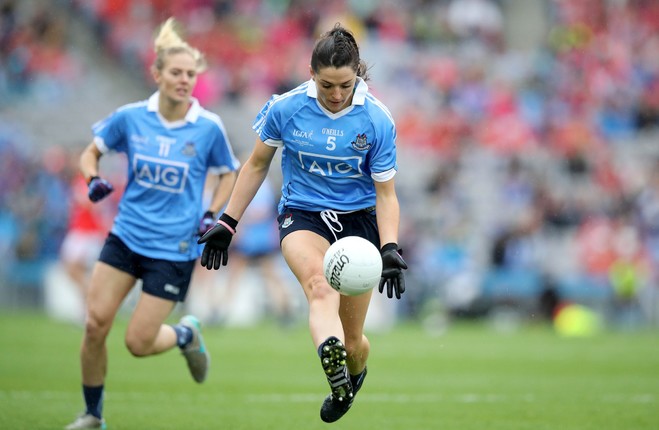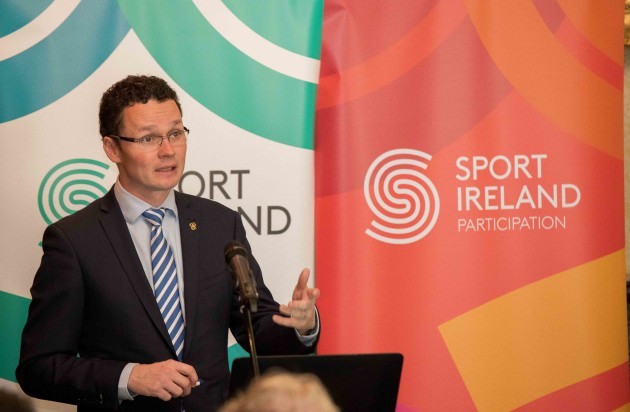DUBLIN’S SINÉAD GOLDRICK believes that inter-county ladies footballers, are victims of ‘inequality’ when Government funding is being dished out.
And Goldrick insists that the money on offer for female players should be on a par with their male counterparts.
It was announced recently that the Gaelic Players Association is due to receive €1.6m from Sport Ireland this year – a figure that will rise to €2.3m next year and €3m in 2019.
In contrast, a two-year agreement commencing in 2017 will ensure Government support through the Women’s GPA, the Camogie Association and the Ladies Gaelic Football Association – but to the more modest tune of €500,000 per annum.
The money filtering down to male players puts female funding firmly in the shade – and Goldrick says that has to change.
She said: “The WGPA has allocated €8,000 to each county team – I’m not sure of the figure they’ve granted to the GPA but there’s a difference.
“It’s a huge step to get that €8,000 but in terms of encouraging equality across the board, we need to allocate the correct funding for men and women’s county teams.
“I know there’s different attendances (between men and women’s games) but I’d love to see the same allocation of funding to women in all sport because if you’re giving different funding, that’s showing inequality.
“I would love to see, at Government level, for funding to be the same allocated to men and women.
“That would be the overall goal – if we want equality for women in sport, we need to see it coming from Government.”
Goldrick, however, harbours doubts about the proposed introduction of a 30 per cent gender quota for sporting bodies, believing instead that the best candidates should fill the roles on offer.
She added: “My view on it is that you give it to the best person in it.
“It’s brilliant that it might encourage people to look at women but the final decision should be based on your expertise as opposed to your gender.”
Ladies football has made huge strides in recent times – with a record attendance present for last year’s TG4 All-Ireland finals – but Goldrick believes that more can still be done.
She is urging the respective Dublin boards to come together and fix ladies games as curtain-raisers to matches involving Jim Gavin’s all-conquering men’s team.
But Goldrick also admitted that it’s an ongoing challenge to persuade females to attend female sports.
She added: “Women need to support women – that’s another thing. It’s about women supporting camogie, rugby and soccer.
“Maybe from women going to men’s matches, there might be more of a social aspect of it as opposed to watching a great game.
“We’ve come a long way and it’s great but looking at different opportunities to showcase our games.
“One thing would be curtain raisers in League games – where the attendance for the men’s game wouldn’t be as high.”
There was good news for Ladies football yesterday when National league sponsors Lidl confirmed that they will be investing a further €1.5m this year – in line with 2016 figures.
And President Marie Hickey, speaking at the League launch, insisted that the Ladies Gaelic Football Association is not resisting a potential merger with the GAA – but warned that it may not happen as soon as some people would hope.
Hickey was reluctant to put a timeframe on the prospect of the LGFA coming under the GAA umbrella, explaining: “There is not resistance as such – I think it’s a natural progression.
“It is something that’s going to happen – but it’s not something that can just happen in a year, or two years.”
Former GAA President Liam O’Neill had aimed to integrate all Gaelic Games bodies into one organisation during his tenure but it’s yet to happen.
Hickey added: “We have worked a lot more together in that last five years with the GAA, with camogie, sitting down talking about things, and stuff like that.
“I wouldn’t like to put a timeframe on it, but I would see that as being this generation thing, as opposed to my generation thing.”
The42 is on Instagram! Tap the button below on your phone to follow us!


